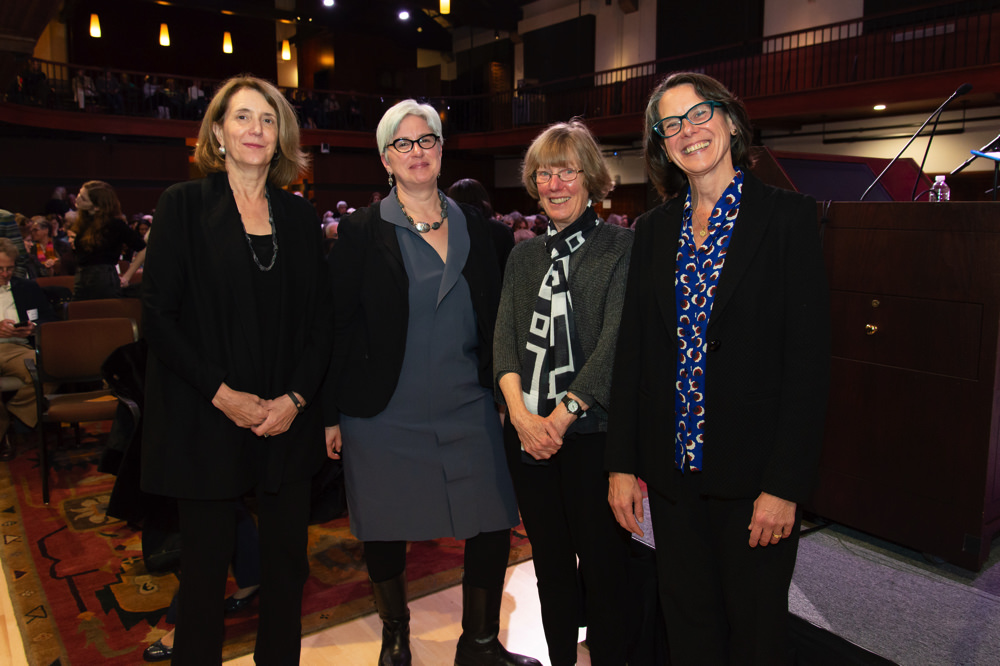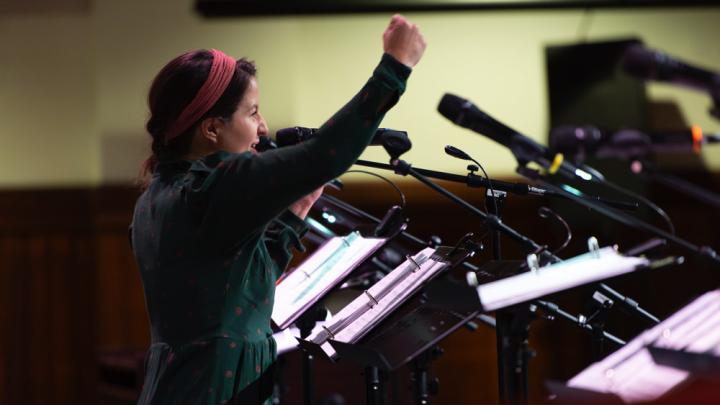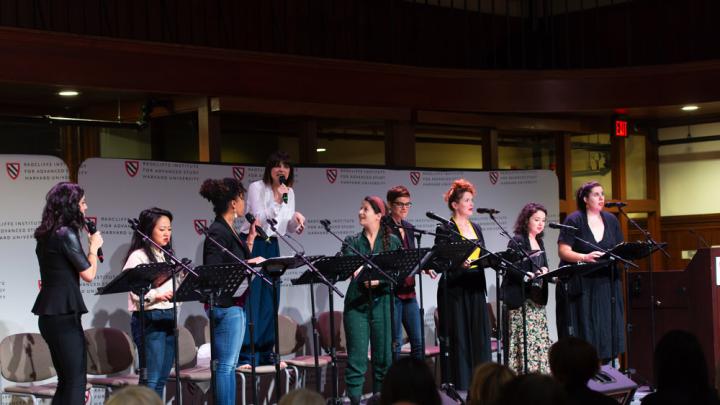New York Times music critic Stephen Holden’s line about Shaina Taub—that she is a gravitational force “around whom others cluster like filings to a magnet”—came powerfully to mind on Monday night inside the Radcliffe Institute’s Knafel Center, where the singer-songwriter (and actor-dancer-musician-dramatist) held the stage for nearly three hours. As part of a celebration for the seventy-fifth anniversary of the Schlesinger Library on the History of Women in America (which is closed now for renovations through Tuesday, November 6), Taub and eight other singers, all women, performed a dozen songs from her musical-in-progress about the American Suffragist movement.
The musical’s working title is “The Suffragists,” and throughout the performance, Taub stood at the center of the group, calling out musical numbers and filling in narrative blanks for the packed audience, as she and the others moved from song to song. Afterward, a panel discussion on the play and its subject turned into an extended Q&A with Taub, as the four academics who’d joined her on stage—scholars of history and music and gender studies—swiveled toward her to ask one excited question after another. Introducing the event, Radcliffe dean Tomiko Brown-Nagin reminded the audience that the women’s suffrage movement seems perhaps especially timely now: “We’re confronted on a daily basis by the reality that various forms of political and social exclusion are still commonplace for many Americans.”
Taub’s musical spans the last decade of U.S. women’s fight to win the vote, and it winds loosely around the rivalry between the fiery militant Alice Paul (whose character Taub voiced) and the older activist leader Carrie Chapman Catt, more given to compromise than combat. “I was an American girl hungry for a story to tell,” Taub said, explaining how she first came to the project several years ago, after her friend Rachel Sussman—co-lead producer of the musical, along with Hamilton producer Jill Furman—gave her a copy of the 1920 book Jail For Freedom, activist Doris Stevens’s firsthand account of the suffrage movement. “I had been looking everywhere, and taking myths and gender-flipping them, looking for a story about girls changing the world.” But the story she’d been looking for “was there all along,” a part of her own history.
Two years later, as a 2016 Radcliffe visiting scholar, Taub conducted research at the Schlesinger, and Susan Ware, the Schlesinger’s honorary women’s suffrage centennial historian, has been an adviser. (On the panel, Ware revealed that she once tried, and failed, to write a biography of Alice Paul, before shifting the research into a different project; “I should have written it as a musical,” she joked.) Taub’s musical isn’t yet finished; she plans to premiere the completed production by 2020, when the Nineteenth Amendment turns 100. The songs she shared on Monday night, all accompanied by piano, explored the tensions between Paul’s idealism and Catt’s practicality, but also between other competing groups, as African American and immigrant and working-class women pushed for equality within the movement.

Panelists (from left) Mason professor of music Carol Oja, RI '17; Jane Kamensky, Pforzheimer director of the Schlesinger Library; Susan Ware, the Schlesinger's honorary women's suffrage centennial historian; and Corinne T. Field, 2018-19 Mellon-Schlesinger Fellow at the Radcliffe Institute and scholar of women, gender, and sexuality at the University of Virginia
Photograph by Kevin Grady/Radcliffe Institute
During the panel discussion, Taub explained that she wanted to draw characters who were fully complex and human and flawed. “These were not perfect warriors,” she said. “These were messy people who did the wrong thing a lot, choosing political expedience over justice-based righteousness. I’m interested in leaning into those problems, and how the characters explore them.” Instead of a morally simple drama that pits suffragists against anti-suffragists or women against men, “I’m interested in, how does a social movement get sustained? How does change get achieved by people who have very different ideas of how to get it, and who sometimes want to get it at the expense of their comrade?”
Led by moderator Jane Kamensky, Pforzheimer director of the Schlesinger Library and Trumbull professor of history, the panelists asked Taub about narrative drive and the natural theatricality of the suffrage movement; they asked about her fidelity to the record in a fictional work about historical people. Ware asked about the temporal scope—after the Nineteenth Amendment passed, Alice Paul, who survived until 1977, campaigned for the Equal Rights Amendment, which remains unratified today. “It’s important to remember,” Taub said, that the passage of the Nineteenth Amendment did not by itself enfranchise all women—Jim Crow laws, for instance, kept African-American women from the polls for several more decades, despite the legal rights laid out in the amendment. “It did pass and it was a hard and huge milestone, but it was in no way the end of the fight, and it’s still not the end of the fight today….We’ve come a long way, but there’s still a long way to go, and that double truth is always true.”
The echo of today’s political struggles lingered throughout the discussion, and it was an echo that Taub, whose artistic work often engages social issues, welcomed. A woman from the audience asked how old Alice Paul was at the start of her career as a suffragist. (In 1913, when the musical opens, Paul was 28.) “The reason I ask,” the woman went on, “is that because when I speak to young people about movement and organizing, they really think it’s something that somehow happens later.” She noted that Martin Luther King was only 26 during the Montgomery Bus Boycott in 1955. “People need to understand that they did not know how to begin, they just jumped in. I get that as a universal message of the [musical]. People think that folks come to this fully formed, and they do not.”
“Absolutely,” Taub said.
As the night wound to a close near 10 p.m., another woman rose from the audience to ask Taub whether her research for the musical had altered her ideas about what makes social change sustainable and effective. “That’s such a good question,” Taub said, launching into a long, searching answer about her own evolving activism, and about rage and exhaustion—and hope, which, unlike simple optimism, demands effort and action. “That’s one thing we have in common with the suffragists: we don’t know how this is going to turn out, and in that space there is room for us to make it turn out in a way that makes a better world.”










